April 20, 2022 •
Super PACs Must Report LLC Attributions
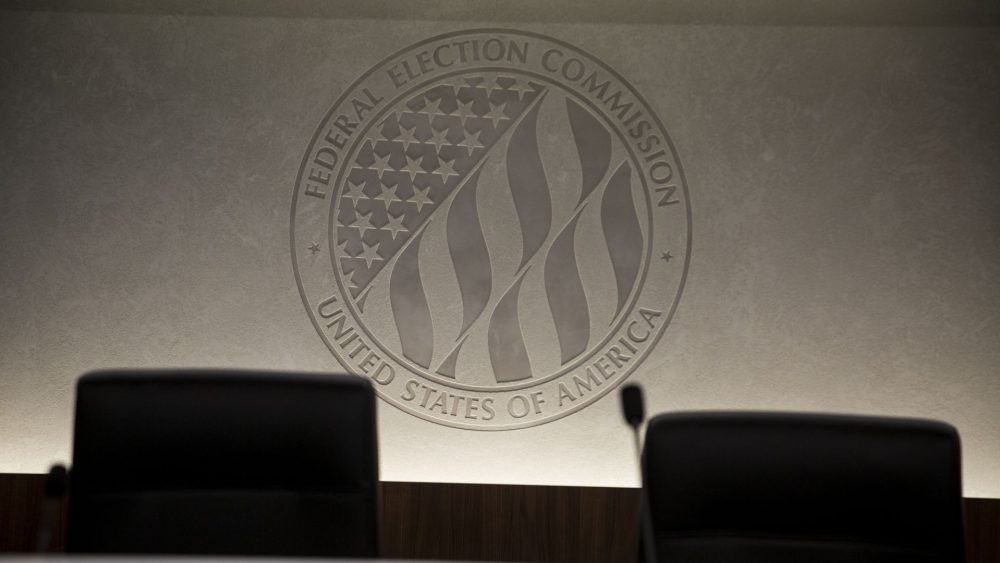
FEC; Photo: Sarah Silbiger/CQ Roll Call
“Going forward,” the Federal Election Commission (FEC) will require disclosure requirements for contributions received from limited liability companies (LLCs) be applied to independent expenditure-only political committees (i.e., Super PACs) in the same manner in which they are applied to all […]
“Going forward,” the Federal Election Commission (FEC) will require disclosure requirements for contributions received from limited liability companies (LLCs) be applied to independent expenditure-only political committees (i.e., Super PACs) in the same manner in which they are applied to all other political committees.
On April 15, four of the six commissioners issued a “Statement of Reasons” for their conclusion of a closeout of a complaint. In the statement, which refers to Matters Under Review (MUR) 7454, Chairman Allen Dickerson, Vice Chair Steven T. Walther, Commissioner Shana M. Broussard, and Commissioner Ellen L. Weintraub assert, “contributions from LLCs to committees must be attributed pursuant to Commission regulations, and those regulations apply to all committees, including [Super PACs]. The Commission will apply that understanding going forward, and may seek civil penalties in appropriate future cases.”
In MUR 7454, the Super PAC in question had not obtained the required attribution information for two contributions made by LLCs. The Super PAC attributed the contributions only to the LLCs. Regulations require committees to report certain attribution information for contributions from LLCs.
An LLC that has a single natural-person member and is not taxed as a corporation must be attributed only to the natural person member, and not the LLC. A contribution by an LLC that is disregarded for tax purposes and does not have a single natural-person member is treated as a partnership contribution; and, a partnership contribution must be attributed to both the partnership and each partner, either in proportion to his or her share of the partnership profits or by agreement among the partners.
In prior cases premised on similar facts, the FEC could not agree whether, following the Citizens United and SpeechNow.org v. FEC court decisions, LLC reporting rules and conduit contribution rules applied to contributions made to the newly formed Super PACs authorized by those judicial rulings. The commissioners determined that “with the passage of time, [Super PACs] have become a regular part of the campaign finance landscape, and…there is no longer a lack of clarity concerning the application of LLC reporting rules and conduit contribution rules in these circumstances.”
Because the FEC has not previously made this conclusion under similar cases, they did not seek a civil penalty against the Super PAC.
January 15, 2020 •
Seattle Passes Two Bills in the Clean Campaigns Act
The Seattle City Council unanimously passed two bills banning most political spending by foreign-influenced corporations and clamping down on political advertising. These bills are part of the Clean Campaigns Act, a three-bill package introduced in August of last year. The […]
The Seattle City Council unanimously passed two bills banning most political spending by foreign-influenced corporations and clamping down on political advertising.
These bills are part of the Clean Campaigns Act, a three-bill package introduced in August of last year.
The first bill prevents corporations with a single foreign national investor holding at least 1% ownership, or two or more holding at least 5% ownership from contributing directly to Seattle candidates, political races, or through PACs.
Companies that have a non-U.S. investor making decisions on its U.S. political activities will also be prevented from political spending.
The measure closes a loophole because foreign individuals and foreign-based entities already are barred from making contributions in U.S. elections.
The second bill adds transparency to the political advertising realm.
It requires any paid advertisement regarding a political matter of local importance to follow stricter reporting guidelines and to retain and provide records about these advertisements.
The third bill, which would place a cap on Super PAC contributions, remains in the Select Committee on Campaign Finance Reform for further discussions.
January 8, 2020 •
Seattle City Council Considering Caps on Super PAC Donations
The Seattle City Council is considering legislation limiting the ability of Super PACs to spend unlimited amounts of money in Seattle elections. Council Member Lorena González introduced the Clean Campaigns Act to reduce the amount of money Super PACs funnel […]
The Seattle City Council is considering legislation limiting the ability of Super PACs to spend unlimited amounts of money in Seattle elections.
Council Member Lorena González introduced the Clean Campaigns Act to reduce the amount of money Super PACs funnel into elections.
The proposed legislation would limit Super PACs from receiving more than $5,000 per year from any single individual or corporation.
The act would also block multinational corporations, defined as companies with more than one percent ownership from a single foreign national or more than five percent ownership from multiple foreign nationals, from spending money on local elections.
Another proposed change would require all political advertising outside of election years to follow similar reporting requirements to current rules for election advertisements.
The Clean Campaigns Act is currently being considered in council chambers and could see a full council vote as early as next week.
March 8, 2019 •
US House Passes HR 1, For the People Act of 2019

On March 8, the U.S. House of Representatives passed a sweeping campaign finance, lobbying, ethics, and election gerrymandering reform bill. Introduced by Rep. John Sarbanes, House Bill 1, the For the People Act of 2019, requires any organization involved in […]
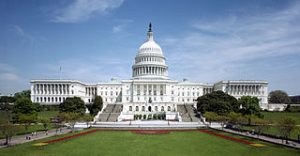 On March 8, the U.S. House of Representatives passed a sweeping campaign finance, lobbying, ethics, and election gerrymandering reform bill.
On March 8, the U.S. House of Representatives passed a sweeping campaign finance, lobbying, ethics, and election gerrymandering reform bill.
Introduced by Rep. John Sarbanes, House Bill 1, the For the People Act of 2019, requires any organization involved in political activity to disclose its largest donors, creates a multiple matching system for small donations for political campaigns, and amends rules governing super PACs.
Additionally, the bill restructures the Federal Election Commission, amends the federal conflict of interest law, and expands the revolving door provision by prohibiting Members of Congress from serving on corporate boards.
If enacted, the bill also requires presidential candidates to disclose their tax returns, prohibits partisan gerrymandering, increases oversight over election vendors, creates an automatic voter registration across the country, and changes registration requirements for lobbyists and foreign agents.
February 27, 2019 •
U.S. House Administration Committee Approves of Campaign Finance and Ethics Legislation
On February 26, legislation aimed at reforming U.S. campaign finance, lobbying, and ethic laws advanced in committee. The House Administration Committee approved of H.R. 1, the For the People Act, by a party-line vote of six to three. In the […]
 On February 26, legislation aimed at reforming U.S. campaign finance, lobbying, and ethic laws advanced in committee. The House Administration Committee approved of H.R. 1, the For the People Act, by a party-line vote of six to three.
On February 26, legislation aimed at reforming U.S. campaign finance, lobbying, and ethic laws advanced in committee. The House Administration Committee approved of H.R. 1, the For the People Act, by a party-line vote of six to three.
In the sweeping 571-page bill, corporate PACs would be required to make certifications annually with the Federal Election Commission. Those certifications would include affirming under penalty of law no foreign national participated in any way in the decision-making processes of the PAC; corporate board members who are foreign nationals abstained from voting on matters concerning the corporation’s PAC; and the PAC did not solicit or accept recommendations from any foreign national.
The legislation expands the definition of foreign national to include any corporation, limited liability corporation, or partnership that is not a foreign national but is owned or indirectly controlled by foreign nationals meeting statutory thresholds of ownership or voting. The threshold is five percent of voting shares if the foreign national is a foreign country, a foreign government official, or a corporation principally owned or controlled by a foreign country or foreign government official. The threshold is 20 percent if the foreign national is any other type of foreign national. Corporations not considered foreign nationals would fall under the definition when a foreign national has the power to direct, dictate, or control the decision-making process of the corporation with respect to its interests in the United States or with respect to activities in connection with federal, state, or local elections.
Additionally, the bill restructures the Federal Election Commission, amends the federal conflict of interest law, and expands the revolving door provision by prohibiting Members of Congress from serving on corporate boards. Introduced by Rep. John Sarbanes, the bill requires any organization involved in political activity to disclose its largest donors, creates a multiple matching system for small donations for political campaigns, and amends rules governing super PACs.
If passed, the bill also requires presidential candidates to disclose their tax returns, prohibits partisan gerrymandering, increases oversight over election vendors, creates an automatic voter registration across the country, and changes registration requirements for lobbyists and foreign agents.
January 7, 2019 •
First U.S. House Bill Introduced is Sweeping Campaign Finance Bill
The first piece of legislation introduced into the new U.S. House of Representative was a sweeping 571-page campaign finance bill. Introduced by Rep. John Sarbanes, House Bill 1, the For the People Act, requires any organization involved in political activity […]
 The first piece of legislation introduced into the new U.S. House of Representative was a sweeping 571-page campaign finance bill. Introduced by Rep. John Sarbanes, House Bill 1, the For the People Act, requires any organization involved in political activity to disclose its largest donors, creates a multiple matching system for small donations for political campaigns, and amends rules governing super PACs.
The first piece of legislation introduced into the new U.S. House of Representative was a sweeping 571-page campaign finance bill. Introduced by Rep. John Sarbanes, House Bill 1, the For the People Act, requires any organization involved in political activity to disclose its largest donors, creates a multiple matching system for small donations for political campaigns, and amends rules governing super PACs.
The bill also restructures the Federal Election Commission, amends the federal conflict of interest law, and expands the revolving door provision by prohibiting members of Congress from serving on corporate boards. If passed, the bill also requires presidential candidates to disclose their tax returns, prohibits partisan gerrymandering, increases oversight over election vendors, creates an automatic voter registration across the country, and changes registration requirements for lobbyists and foreign agents.
Sarbanes argued the rational for the bill in his press release, stating, “The bold, transformative set of reforms that we introduced today will strengthen our democracy and return political power to the people by making it easier, not harder, to vote, ending the dominance of big money in our politics and ensuring that public officials actually serve the public.”
October 23, 2017 •
FEC Fines Federal Contractor for Contribution to Super PAC
Contributions by federal contractors to federal independent expenditure-only political action committees, also known as super PACs, may violate the federal pay-to-play prohibition. On September 25, 2017, the Federal Election Commission (FEC) entered into a Conciliation Agreement with a federal contractor […]
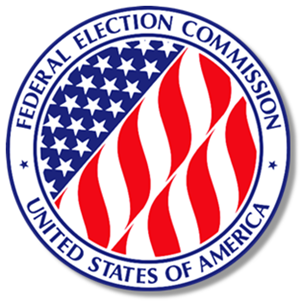 Contributions by federal contractors to federal independent expenditure-only political action committees, also known as super PACs, may violate the federal pay-to-play prohibition.
Contributions by federal contractors to federal independent expenditure-only political action committees, also known as super PACs, may violate the federal pay-to-play prohibition.
On September 25, 2017, the Federal Election Commission (FEC) entered into a Conciliation Agreement with a federal contractor after finding the contractor had violated pay-to-play prohibitions by making contributions to a federal independent expenditure-only political action committee.
The FEC fined the contractor, Suffolk Construction Company, $34,000 for making two $100,000 contributions in 2015 to Priorities USA Action, a super PAC supporting then presidential candidate Hillary Clinton. Because the matter was resolved by agreement between the FEC and the contractor, there was no challenge made to the FEC’s fine.
November 8, 2016 •
Tuesday Lobbying and Campaign Finance News Update
Lobbying “Ex-PMO Aide Bruce Carson Fined $50,000 for Illegal Lobbying” by Marco Vigliotti for The Hill Times “Incoming Florida House Speaker Bans ‘Texting While Legislating’” by Mary Ellen Klas for Miami Herald Campaign Finance “Court Challenge Seeks to Outlaw Super […]
 Lobbying
Lobbying
“Ex-PMO Aide Bruce Carson Fined $50,000 for Illegal Lobbying” by Marco Vigliotti for The Hill Times
“Incoming Florida House Speaker Bans ‘Texting While Legislating’” by Mary Ellen Klas for Miami Herald
Campaign Finance
“Court Challenge Seeks to Outlaw Super PACs” by Kenneth Doyle for Bloomberg BNA
“California Ethics Watchdog Proposes $57,000 Fine Against Sen. Tony Mendoza” by Taryn Luna for Sacramento Bee
Ethics
“These Officials Help Write Ballot Questions. Companies Write Them Checks.” by Eric Lipton and Robert Faturechi for The New York Times
“2 Ex-Christie Allies Are Convicted in George Washington Bridge Case” by Kate Zernike for The New York Times
“Former Gov. Bob McDonnell Hosts Party to Celebrate Overturned Corruption Conviction” by Alissa Skelton for The Virginian-Pilot
Elections
“Memes, Myself and I: The Internet lets us all run the campaign” by Amanda Hess for The New York Times
“Donald Trump’s Extremist Supporters Feel Like Winners Either Way” by Jonathan Mahler and Julie Turkewitz for The New York Times
“Inside Donald Trump’s Last Stand: An anxious nominee seeks assurance” by Maggie Haberman, Ashley Parker, Jeremy Peters and Michael Barbaro for The New York Times
In an end-of-session bipartisan push, the Legislature and governor have come to agreement on ethics reform measures. Their five-point plan includes the following: With more disclosure measures in place, super PACs are now able to give and receive unlimited contributions […]
 In an end-of-session bipartisan push, the Legislature and governor have come to agreement on ethics reform measures.
In an end-of-session bipartisan push, the Legislature and governor have come to agreement on ethics reform measures.
Their five-point plan includes the following:
- With more disclosure measures in place, super PACs are now able to give and receive unlimited contributions if they do not coordinate with a candidate;
- Public officers convicted of corruption may face revocation or reduction of their pensions;
- First-time political consultants will be required to disclose when they simultaneously represent political officeholders and private sector clients with government business;
- The reporting thresholds for organizations who lobby on their own behalf has been lowered from $50,000 to $15,000 while individual limits have been lowered from $5,000 to $2,500;
- Contributions over $2,500 to organizations engaged in lobbying must now also be reported to JCOPE; and
- 501(c)(4) organizations will now be required to disclose funding if they engage in political activity and receive any financial support and in-kind donations from 501(c)(3) organizations.
Other new features from the plan include imposition of fines up to $10,000 or the amount of promised contingency fees for anyone violating the state’s prohibition on contingency fee lobbying, a delineation excluding all communication with journalists from the definition of lobbying, and more due process rights for individuals being investigated by the Joint Commission of Public Ethics (JCOPE), including the right to a hearing.
June 9, 2016 •
New York Governor Pushes for PAC Reforms
Gov. Andrew Cuomo has outlined another bill to supplement his ethics reform agenda. If passed, the new bill would create regulations and restrictions for independent expenditure campaigns and improve transparency, with the ultimate goal of preventing candidates from having direct […]
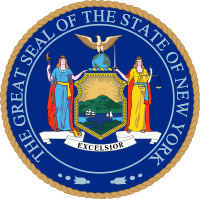 Gov. Andrew Cuomo has outlined another bill to supplement his ethics reform agenda.
Gov. Andrew Cuomo has outlined another bill to supplement his ethics reform agenda.
If passed, the new bill would create regulations and restrictions for independent expenditure campaigns and improve transparency, with the ultimate goal of preventing candidates from having direct control over Super PACs by selecting friends or political allies to steer them.
The new bill is an effort to coax the Legislature to pass ethical reforms before their session comes to a close next week.
July 17, 2014 •
Thursday News Roundup
Lobbying “Who Has Time for Legislating Anyway? | K Street Files” by Kate Ackley in Roll Call. “K Street eyes spending bills to stop Obama” by Megan R. Wilson and Tim Devaney in The Hill. Kentucky: “U.S. Rep. Ed Whitfield […]
 Lobbying
Lobbying
“Who Has Time for Legislating Anyway? | K Street Files” by Kate Ackley in Roll Call.
“K Street eyes spending bills to stop Obama” by Megan R. Wilson and Tim Devaney in The Hill.
Kentucky: “U.S. Rep. Ed Whitfield of Kentucky Had Decade-Long Financial Tie To a Lobbyist” on WKMS.
Campaign Finance
“Data Delayed Is Democracy Denied” op-ed by Robert Biersack in The New York Times.
“Big Checks Strengthen Super PACs” by Kent Cooper in Roll Call.
“The massive difference in how Democrats and Republicans raise money” by Philip Bump in The Washington Post.
“Senate hopeful’s donations raise questions on source” by Todd Spangler (Detroit Free Press) in USA Today.
“The Easiest Fix for Dark Money: Disclose Less Often” by Lindsay Mark Lewis in The Atlantic.
California: “Gov. Brown allows advisory ballot measure on Citizens United decision” by Patrick McGreevy in the Los Angeles Times.
Kentucky: “Fake KY senate candidate draws attention campaign finance reform” by Lawrence Smith on WDRB.
Missouri: “We Asked Five Questions About Campaign Finance Reports. Here Are The Answers” by Jason Rosenbaum on St. Louis Public Radio.
New Jersey: “Princeton moves to restrict campaign donors” by Nicole Mulvaney in Times of Trenton.
Philadelphia, Pennsylvania: “Ethics Board to consider stricter campaign finance regulations” by Claudia Vargas in The Inquirer.
Ethics
“Bill proposes ethics classes for Congress” by Al Kamen and Colby Itkowitz in The Washington Post.
Redistricting
“Florida Will Wait Til After November to Redraw Redistricting Map” by Mary Ellen Klas in Governing.
April 28, 2014 •
Federal Court in NY Strikes Down Aggregate Limits
The U.S. District Court for the Southern District of New York struck down a campaign finance law limiting contributions to super PACs. Sections 14-114(8) and 14-126 of the New York Election Law impose an annual aggregate contribution limit of $150,000 […]
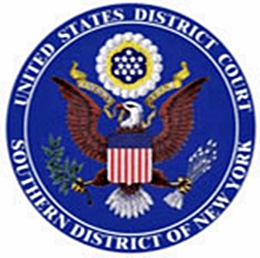
The U.S. District Court for the Southern District of New York struck down a campaign finance law limiting contributions to super PACs. Sections 14-114(8) and 14-126 of the New York Election Law impose an annual aggregate contribution limit of $150,000 per contributor. Plaintiff New York Progress and Protection PAC challenged the aggregate contribution limits on First Amendment grounds.
The committee, although ruled by the court to be an independent expenditure committee, was formed to support the candidacy of Republican Joseph Lhota, the unsuccessful New York City mayoral candidate in 2013.
Judge Paul A. Crotty, citing the precedent established in Citizens United and McCutcheon, enjoined New York’s aggregate contribution limit as applied to independent expenditures.
January 28, 2013 •
Potential Vermont Legislation May Increase PAC Disclosures
Bill may also increase filing frequency
 Representative Kurt Wright announced his intention to introduce campaign finance legislation that will enhance disclosures in an election year. Wright and 10 other legislators are working on legislation that would require campaign finance reports to be filed monthly after January 15 in an election year, and increase filing to biweekly leading up to a primary or general election.
Representative Kurt Wright announced his intention to introduce campaign finance legislation that will enhance disclosures in an election year. Wright and 10 other legislators are working on legislation that would require campaign finance reports to be filed monthly after January 15 in an election year, and increase filing to biweekly leading up to a primary or general election.
Currently, filings are due monthly after July 15.
The bill will also contain provisions related to donor disclosure, requiring PACs to disclose a top contributor if he or she provides more than half of all contributions in a six-month period, and super PACs to disclose their top three donors if their combined contributions account for more than half of contributions received.
Photo of Vermont State House by Jared C. Benedict on Wikipedia.
December 21, 2012 •
News You Can Use Digest – December 21, 2012
Here are highlights from the latest edition of News You Can Use:

National:
NRA Power and Money Goes a Long Way in States
The GOP’s Electoral College Scheme
Federal:
Colbert Super PAC to Give to Charities
Crossroads GPS Claim: What Karl Rove’s dark money nonprofit told the IRS
From the States and Municipalities:
Alaska
Legislative Aide Resigns after Anti-Islamic Agenda Crosses into Public Role
Arkansas
Admitted Inappropriate Relationship Threatens McDaniel’s 2014 Bid to Become Arkansas’ Governor
California
More Valuable Gifts, Contributions Allowed to Politicians in 2013
California
State Political Watchdog to Enforce San Bernardino County’s Campaign Finance Ordinance
Louisiana
New Orleans Mayor Mitch Landrieu to End Contracts with Firm Tied to Ray Nagin Bribery Probe
New York
Cup of Coffee Limit Perks Up Again
New York
NY State Urges Aetna to Reveal Political Spending
Washington
House Bill Would Impose Fees on Lobbyists, Others
 State and Federal Communications produces a weekly summary of national news, offering more than 80 articles per week focused on ethics, lobbying, and campaign finance.
State and Federal Communications produces a weekly summary of national news, offering more than 80 articles per week focused on ethics, lobbying, and campaign finance.
News You Can Use is a news service provided at no charge only to clients of our online Executive Source Guides, or ALERTS™ consulting clients.
State and Federal Communications, Inc. provides research and consulting services for government relations professionals on lobbying laws, procurement lobbying laws, political contribution laws in the United States and Canada. Learn more by visiting stateandfed.com.


